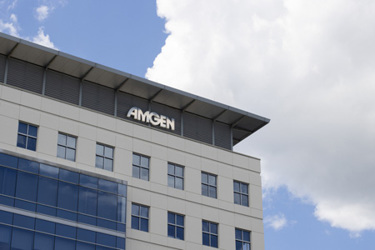Amgen Bets On Agility In The Age Of AI
A conversation with Oliver Thiel, Amgen

Biomanufacturing is many things. Agile isn’t one of them, but Amgen is betting that speed and flexibility can be built into the backbone of its operations with help from advanced technology and flexible business processes.
The company is taking a holistic approach to speed using technology like predictive analytics, digital twins, and generative AI copilots to develop, scale, and optimize complex biologics manufacturing.
Oliver Thiel, Amgen’s vice president of operations commercialization, spoke about the company’s continuous improvement efforts at the International Society for Pharmaceutical Engineering’s 2025 ISPE Biotechnology Conference, June 2 and 3 in Boston.
After his presentation, he agreed to share insight into the company’s strategy and answer some questions.
Everyone wants agility, but it's notoriously difficult in biomanufacturing. What does agility mean in day-to-day operations, and how do you measure it?
Thiel: At Amgen, agility stands for speed to market and speed in market, and it is about our ability to adapt to changing internal and external circumstances. It is measured by our commercialization timelines for our pipeline assets and our ability to react to changes in the market for our commercial assets in an agile manner. Specifically, we focus on being able to actively respond to patient needs through lead time reductions where it matters. We do this by harnessing market insights, data, and predictive capabilities to capture market opportunities. This enables faster decision-making with real-time analytics.
We build flexible business processes to allow us to adapt and adopt disruptive approaches from best-in-class logistics and supply chain expertise to advance our capabilities. Overall, we aim to maximize the organizational capabilities of operations to accelerate the pace of innovation.
Our strong culture and business process for continuous improvement have delivered an inherent agility to how we work. We do this in two ways: by proactively seeking out new and better ways to future-proof and by responding to problems with a can-do confidence driven by a track record of continuous improvement.
What’s a piece of technology — a sensor, a model, or a visualization tool — that your team was initially skeptical about but ended up being a game-changer?
Thiel: At Amgen this is rare, since we believe that innovation operates on a continuum that stretches from process development to manufacturing. Initially, the curiosity of our scientists and engineers allows us to explore many technologies within our process development laboratories.
Operating on the edge of scientific progress will always result in some skepticism, but without curiosity there will be no true innovation. We believe, what differentiates Amgen is our ability to translate and implement the most promising of these technologies within our manufacturing facilities. We leverage a well-established process called technology innovation governance to select and resource the most promising innovations. The early assessment in the process development labs allows us to quickly understand the potential business impact of the technology leveraging limited investments.
Once we understand the potential of a technology to drive a real impact across the categories of reliability, efficiency, and agility, we double down and work with our colleagues in the manufacturing or quality areas to implement the technology.
The other benefit of this process is that it allows us to implement technologies in the areas of greatest impact. Sometimes technologies are being employed too generally and are therefore diluted in their impact. A good example is continuous manufacturing of biologics.
We explored continuous manufacturing of biologics holistically and implemented the components and aspects of continuous manufacturing that enabled the business needs, e.g., production of complex bispecific molecules.
Wrangling vast amounts of data is a persistent challenge. As we see more monitoring technology producing more data, how do you ensure compatibility and meaningful use?
Thiel: Within Amgen operations, we are in the privileged position to generate significant amounts of data across process development, manufacturing, and quality. The most important aspects of data generation are the FAIR principles. That means that data should be findable, accessible, interoperable, and reusable. One of Amgen’s core values is being science-based. We truly believe in the importance of data-based decision-making. Therefore, we have been proactive and have invested significantly to create a state-of-the-art data infrastructure that relies on an enterprise data fabric (EDF).
Today, most of our business processes are enabled by data and analytics that are based on the EDF and flow automatically from our electronic notebooks, bench instruments, development life cycle platforms, and other key systems or records like enterprise resource planning (ERP), manufacturing execution system (MES), and laboratory information management system (LIMS).
Similarly, all process monitoring and release data from our manufacturing site and quality control labs flows into the EDF. Our scientists and engineers have access to this data and can make data-based decisions and build on past platform learnings. This allows us to perform real-time multivariate statistical monitoring, predictive CQA analysis, and automated process capability analysis.
Where has digital innovation actually made a measurable change in throughput? Where does it still fall short?
Thiel: Our utilization of data from the manufacturing sites has clearly moved the needle for us over the last decade, improving the reliability and efficiency of our processes. Another key example is our utilization of digital twins to support process development and manufacturing.
We have a bold ambition to establish digital twins for all our unit operations. This allows us to reduce experimentation and leads to process understanding, more reliable transition across process scales, and, ultimately, more robust processes. We have established in silico modeling from improved gassing strategies for bioreactors and key unit operations like diafiltration and lyophilization that allow for seamless technology transfers to our manufacturing sites.
The next large frontier is the application of generative artificial intelligence in process development. We are early adopters and expect to see true value return inflection in this area over the next five years.
How do you balance trust in AI-generated models vs. human expertise?
Thiel: Artificial intelligence has the potential to significantly change how we develop and commercialize biologics and pharmaceuticals. At Amgen, we are pursuing a human-in-the-loop strategy for the application of generative AI and machine learning models.
This offers us the benefit of being able to leverage big data sets while still relying on the significant subject matter expertise of our staff in the final interpretation. Process development staff are using generative AI productivity tools with high adoption rates. We have more than 1 million documents in our curated technical knowledge base, which is at the fingertips of staff via generative AI to generate insights instantaneously.
Generative AI is already providing value in standardizing and automating business processes like technical and regulatory authoring of documents, while always bringing the differentiated element of human expertise at crucial value-add activities of these business processes.
Generative AI models are developed, tested, and deployed with a rigorous set of evaluations and with a risk-appropriate computer systems validation, so that accuracy is built in by design. Subject matter experts are an integral part of this process, and ultimately decisions are made by staff informed by generative AI copilots.
About The Expert:
 Oliver Thiel is vice president of operations commercialization at Amgen where he leads teams who are accountable for coordinating product delivery across the company’s commercial products and clinical portfolio. Before joining Amgen, he was a postdoctoral fellow at Stanford University. He has an M.Sc. in chemistry from the Technical University of Munich. He received his Ph.D. from the Max Planck Institut für Kohlenforschung.
Oliver Thiel is vice president of operations commercialization at Amgen where he leads teams who are accountable for coordinating product delivery across the company’s commercial products and clinical portfolio. Before joining Amgen, he was a postdoctoral fellow at Stanford University. He has an M.Sc. in chemistry from the Technical University of Munich. He received his Ph.D. from the Max Planck Institut für Kohlenforschung.
